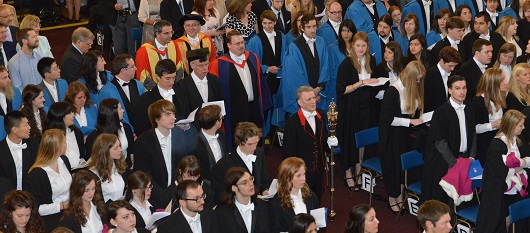Graduation address: Professor Alex Danchev

Chancellor, ladies and gentlemen, esteemed colleagues, distinguished honorands, I hope you will forgive me if I address myself in the first instance to the smiling sea of new graduates itching to make an end to these proceedings, to make an exit from this hall, to make an entrance into a new life – first of all, perhaps, to make the acquaintance of a glass of something suitable to the occasion.
However that may be, this is an occasion. I hope you experience it as such; and I think we do well to pause and reflect on what it means, individually and collectively. It is, I suppose, at once celebration and codification, a rite of passage, unimaginable beforehand, unforgettable afterwards. So we hope. Above all, perhaps, it is a moment of transition, from one stage to the next. I want to mark that moment by taking as my address a letter written by the great Russian playwright Anton Chekhov to his brother Nikolai, in 1886.
Chekhov wanted to give his brother some advice on how to live his life – how to live a good life, as we might say – how to live well. Living well meant cultivating a number of characteristics that go to make up what Chekhov would have called a human being – a civilized human being. The letter is couched as a list of those essential characteristics. I will share them with you. I remind you that it was written in 1886; but I venture that it is surprisingly up-to-date. As the list unfolds, we may ask ourselves, how do we measure up?
Civilised people, says Chekhov, must satisfy the following conditions. I quote:
- ‘They respect the individual and are therefore always indulgent, gentle, polite, and compliant. They do not throw a tantrum over a hammer or a lost eraser. When they move in with somebody, they do not act as if they were doing him a favour, and when they move out, they do not say, “How can anyone live with you!” They excuse noise and cold and overdone meat and witticisms and the presence of others in their homes.
- Their compassion extends beyond beggars and cats…
- They respect the property of others, and therefore pay their debts.
- They are candid and fear lies like the plague. They do not lie even about the most trivial matters. A lie insults the listener and debases him in the liar’s eyes. They do not put on airs, they behave in the street as they do at home, and they do not try to dazzle their inferiors. They know how to keep their mouths shut and they do not force uninvited confidences on people. Out of respect for the ears of others they are more often silent than not.
- They do not belittle themselves merely to arouse sympathy. They do not play on people’s heartstrings to get them to sigh and fuss over them. They do not say, “No one understands me!” or “I have squandered my talent on trifles!” because this smacks of cheap effect, and is vulgar, false and out-of-date.
- They are not preoccupied with vain things. They are not taken in by such false jewels as friendships with celebrities, … popularity among the tavern crowd… When they have done a penny’s worth of work, they do not try to make a hundred roubles out of it, and do not boast of being admitted to places closed to others. True talents always seek obscurity. They try to merge with the crowd and shun all ostentation…
- If they have talent, they respect it. They sacrifice comfort, women, wine and vanity to it… What is more, they are fastidious.
- They cultivate their aesthetic sensibilities. They cannot stand to fall asleep fully dressed, see a slit in the wall teeming with bedbugs, breathe rotten air, walk on a spittle-laden floor or eat off a kerosene stove. They try their best to tame and ennoble their sexual instinct…’
Perhaps that is cutting a little close to the bone for a graduation address. Chekhov himself seems to have been of the same mind. The letter concludes as follows:
‘And so on. That’s how civilised people act. If you want to be civilised and not fall below the level of the milieu you belong to, it is not enough to read The Pickwick Papers and memorise a soliloquy from Faust.
You must work at it constantly, day and night. You must never stop reading, studying in depth, exercising your will. Every hour is precious.
I expect you… We all expect you.’
So it ends. Let me echo Chekhov. We all expect you: to live well, out there, in the world, as civilised people … as human beings.
Congratulations.
Go to it.
Category University news